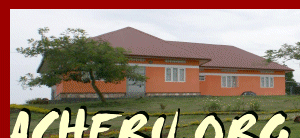|
|
| Circular -
March 2018 |
| Sustainability. That's the aim of many charitable projects in Uganda. Sounds good as an aim but it's fraught with difficulty. I've seen so many projects funded from overseas, the plan being that the donors provide funds for a stated period, giving the project time to become established and self sufficient. Almost inevitably, soon after the donors withdraw, the project fails. We want every possible effort to be made by Acheru to develop sources of income but we have to be realistic too. The latest Acheru annual report indicates that over the last year we have provided 96% of their funding. Whatever we might like to think of as the ideal way forward, if we reduce funding then the work will suffer and fewer children will be treated. I should make clear that I am confident every effort is made at Acheru to work within budget and reach as many children as possible. The recent evaluation of Acheru, which I referred to in an earlier update, highlighted a number of issues and we'll be considering all comments and recommendations in detail, but the report also endorses the quality of the work and the high standards of treatment and care. It was also clear that demand for Acheru services remains high and continues to satisfy our criteria by trying to reach those children who are most in need. |
| People there continue to depend on us and lives are changed, so we want to continue. But how? Every year I am sure to receive another proposal from Uganda for a 'self sufficiency' scheme to generate income for Acheru. I know from long experience that they are likely to fail, requiring substantial investment with little chance of there ever being a worthwhile return. What might work for an individual or a business won't work for a charity. Money given to us is for our witness to children and I have repeatedly made it clear that I will never risk donor's money on speculative ventures. It is a charitable work and will remain so. |
| While I encourage the Acheru board to seek help from other sources within Uganda, the only realistic source of local income is through patient fees, and very little comes in from this. There's some prosperity alongside all the poverty in Uganda and we hoped by now parents could pay more for their children's treatment, but the perception remains among many that a disabled child is cursed and has no value, so why spend money on them? We can't just turn them away as we won't let the children suffer because of the parents, and there's the hope that the witness of Acheru will help change their attitude to the child. We have to remember too that despite the apparent level of prosperity we still work mostly among the poor and I know from the community reports that many live in conditions of serious deprivation, often made worse by having to care for a disabled child with consequent rejection by their family and community. So where does that leave us now? It's not all bad news. Efforts are made to promote Acheru in Uganda through events, the media, groups of visitors, follow ups etc and this helps bring in patients, develops a widespread witness, and helps change attitudes to the disabled. I remain convinced by the need, and by the effectiveness of what's being done. |
| Your help and encouragement enables us to plan ahead and, following the evaluation and report, to look at some possible upgrades and improvements. We're now looking at all the options and I hope to have more news soon. We'd like to see other sources of funding developed but I'm not making conditions or setting deadlines. Last year was the busiest yet for Acheru with 1742 children treated and I think the following 'before and after' pictures will speak for themselves. |
 
|
| Juliet |
 
|
| Lillian |
 
|
| Namwanda Joan |
 
|
| Nyarwa Magdalena |
| Brian Dorman |
|
|
|



